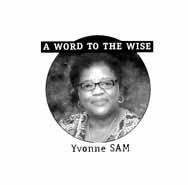
For decades, Black activists have organized in response to police brutality, but part of the underlying reason for the visibility and nomenclature of the current Black Lives Matter movement is the fact that such problems have persisted, and even seem to escalate.
The birth of the movement as a hashtag was somewhat precipitous, and to this day still remains somewhat of an enigma. Confusion swirls around what BLM really is, mainly because of its dual existence, both as a discrete national network of activists and at the same time as a much more amorphous movement focusing largely on police brutality.
And it was not without its growing pains as it struggled to gain recognition and momentum against its rhetorical cousins All Lives Matter and White Lives matter, a blatant evasion of the specificity of Black concerns. The argument was that by exclusion therein lay the succinct suggestion that other lives mattered less. The crux of the matter lay in the reality that white lives are the standards to which people of color have been and still are held accountable, in addition those to which people of color are taught to strive and obtain.
While it is true that all lives matter, it is also equally true that not all lives are understood to matter. Why must we continue to identify and name the lives that have not mattered and continue to struggle to matter in the way they deserve.
Like it or not, we must face the fact that neither Canada nor the U.S.A are unified countries, and the issue of racism, no matter how well clad or disguised it may be, is never a welcome or accepted guest in any discussion or at any table. Plainly stated, or better put, as a society we are not prepared to confront the myriad of ways in which racism still divides us. Our social differences significantly influence our social perceptions, thereby giving credence to the truism that we do not all see factious events the same way.
It is obvious that individuals from different social backgrounds will tend to have different implicit associations, spontaneous personality trait inferences, and judgments of perceived similarity. This means that when individuals from different backgrounds experience the same phenomena, they can come to totally different conclusions regarding what they have seen. Sadly.
Black folks remain at the top of almost every imaginable statistical measure, and conversely at the bottom of most of the good ones.
At the risk of being viewed as the portender of doom and gloom or merely prescient, permit me to express my nagging fear that though well founded, the Black Lives Matter Movement is not well-grounded, and will ultimately fizzle to a mere chatter. While the movement and the moment feels replete with possibility, and is being fuelled by the fierce urgency of now, there nevertheless lurks the danger of coming up empty and unfulfilled.
To make any significant headway there must be a change in strategy. Influence must be translated into policy, with a national chorus of voices increasingly speaking as one cohesive force for real change. They are literally shooting themselves in the foot if attention is only being drawn to police officers accused of misconduct; in no way is this approach going to dismantle systemic injustice, although it may be considered a start.
Rather than demanding a series of changes, the movement should instead focus on a solitary reform that could significantly reduce police violence, and as a result be the forerunner for other policy changes. Like a trustworthy GPS there must be some serious recalculation, and asking how to change course and go from Black Lives Matter to changing the policies that devalue Black lives. Political victories are usually won by framing an issue in a manner that points to only one reasonable solution.
It is questionable whether in the face of marches and protests against continuing police brutality, that public opinion has become more sympathetic to the cause of the BLACK LIVES MOVEMENT. Hardly likely, and part of this reluctance may be attributable to the fact that anything and everything that has to do with Black resistance gets dubbed “Black Lives Matter.” The ubiquity of the name itself and the fact that it can be used by anyone is a cause for serious concern.
There has to be something positive and bigger than marches and protests to move the people forward. Political strategies, meetings, campaigns, community mobilization, etc., would not mean much of anything without a rejuvenated communal civics lesson leading the effort. We have to have an educational process, for example, what a prosecutor does, how the justice system is structured, for the community needs to know the role of certain individuals in places, how their votes matter in these places, and that people fully understand what they are voting for.
The movement continues to have meetings and dialogue with elected officials, but the community is not being educated about the roles these people play. There is an urgent need to go past unproductive dialogues about race and justifications for reproducing discrimination and marginalization and accept the challenge to regroup the various levels of communal activism, organization and thought leadership, weaving them into one cohesive force for real change.
Change never occurs at the top and that’s what really matters.

















1 Comment
Black Studies Center (BSC) August 25, 2016 at 7:29 am
To the Editor
Thank you Yvonne for your insights. Too many Black people think that by just shouting racism, profiling, discrimination that it will go away. They think that by simply electing a Black to office that change will come, so they can go back to sleep and wake up in the garden of Eden. More Black police does not translate into less police brutality. Crying on TV for the Evening News makes for great theater but it obviously does not solve our problems. You are right marches are becoming less and less effective. First they highlight but do not define strategic long term and sustained action. Moreover, they have been appropriated by the power brokers and used to show demonstrate the system’s capacity to protect democratic opposition while ensuring law and order. The system wins because marches tend to be an end in themselves, a stage for everyone to play on. We have to get rid of the ‘”Boko Harams” who steel and corrupt our children and the negative voices among us that keep saying we have nothing and is capable of nothing. We have to go out there and demand that our children pay back something to the community and do not take it for granted that their present access (limited as it may be ) is guaranteed in perpetuity. We got to understand that the Police is not our single source of problems and barriers. The Governments are worse than the police they (the Feds and the Provinces) have structured the society in such a way that only two settler classes run things. The police knows who paying them and whose rights and freedoms come first. Police are society’s killers. We give them the power to arrest Governor Generals, Premiers, Mayors, themselves,etc. Our problem is the system. And to change that we have ti keep hacking away at the system. forever and ever. Balance has to be attained and maintained because the system is in a state of continuous change.
Clarence S. Bayne